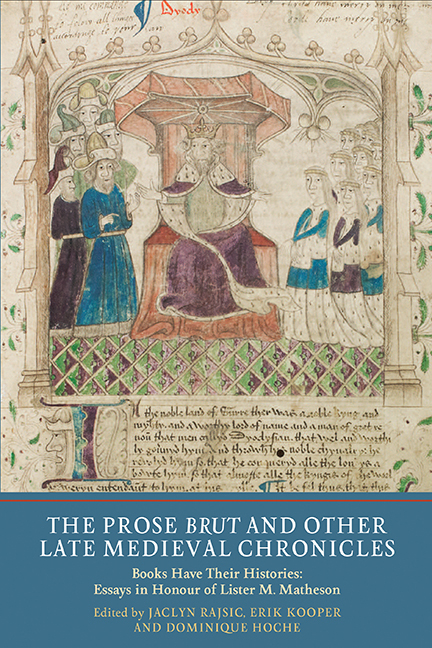 The Prose Brut and Other Late Medieval Chronicles
The Prose Brut and Other Late Medieval Chronicles Book contents
- Frontmatter
- Dedication
- Contents
- List of Plates
- List of Contributors
- Acknowledgements
- Curriculum Vitae of Lister M. Matheson
- Introduction
- A Memoir: The Whole Haggis: Lessons From the Work of Lister M. Matheson
- Part I Uses of History
- Part II The Prose Brut
- 5 Longleat House MS 55: An Unacknowledged Brut Manuscript?
- 6 Peculiar Versions of the Middle English Prose Brut and Textual Archaeology
- 7 The English Prose Brut Chronicle on a Roll: Cambridge, Corpus Christi College, MS 546 and its History
- 8 Re-Printing or Remaking? The Early Printed Editions of the Chronicles of England
- Part III Receptions and Afterlives of Late Medieval Chronicles
- Index of Manuscripts Cited
- General Index
- Tabula in Memoriam
7 - The English Prose Brut Chronicle on a Roll: Cambridge, Corpus Christi College, MS 546 and its History
from Part II - The Prose Brut
Published online by Cambridge University Press: 05 July 2016
- Frontmatter
- Dedication
- Contents
- List of Plates
- List of Contributors
- Acknowledgements
- Curriculum Vitae of Lister M. Matheson
- Introduction
- A Memoir: The Whole Haggis: Lessons From the Work of Lister M. Matheson
- Part I Uses of History
- Part II The Prose Brut
- 5 Longleat House MS 55: An Unacknowledged Brut Manuscript?
- 6 Peculiar Versions of the Middle English Prose Brut and Textual Archaeology
- 7 The English Prose Brut Chronicle on a Roll: Cambridge, Corpus Christi College, MS 546 and its History
- 8 Re-Printing or Remaking? The Early Printed Editions of the Chronicles of England
- Part III Receptions and Afterlives of Late Medieval Chronicles
- Index of Manuscripts Cited
- General Index
- Tabula in Memoriam
Summary
CAMBRIDGE, Corpus Christi College, MS 546 (hereafter Corpus 546) is one of four royal genealogical rolls currently held in the Parker Library's collection. It was written in 1527, in English and on paper, by a certain Ambrose Middelton of Inner Temple in London, we learn from a Latin colophon at the end of the roll. The roll begins with the Creation (a prologue describes the seven days in which God created the world) and, like several royal genealogies produced in fifteenth-century England, the illustrated tree diagram in Corpus 546 opens with a roundel for Adam and Eve, from whom all proceeding figures are shown to descend. The diagram progresses through selected Old Testament figures and Trojan kings until it reaches Aeneas, Silvius and Brutus. It continues through a host of legendary British rulers, ultimately derived from Geoffrey of Monmouth's Historia regum Britanniae (c. 1136), and then through Anglo-Saxon kings. Lines of popes and emperors run down the left and right sides of the roll, as is common in many genealogical rolls produced in late medieval England. However, while these other rolls bring the diagrammatic history up to date with contemporary English rulers, Corpus 546 ends with the Anglo-Saxon king Harold, son of Godwine. Little is known about this roll, and it has not yet benefitted from critical study. However, as I aim to demonstrate here, it will be of great interest to scholars interested in royal genealogies and, especially, in the Prose Brut.
I argue in this essay that Cambridge, Corpus Christi College, MS 546 presents a hitherto unidentified text of the English Prose Brut chronicle, albeit a highly abbreviated version of it. To demonstrate this, I examine two episodes and one narrative feature that are characteristic of the Prose Brut but are not necessarily found in other histories of England's rulers: the story of Albina; the tale of King Curan, known to readers of medieval romance as Havelok the Dane; and the Prose Brut's sequence of early Anglo-Saxon kings. I suggest that Corpus 546 belongs in Lister Matheson's group of ‘Very Short Texts Based on the Brut’, in his ‘Peculiar Texts and Versions’ category, and I also contend that it is unique in the Prose Brut tradition.
- Type
- Chapter
- Information
- The Prose Brut and Other Late Medieval ChroniclesBooks have their Histories. Essays in Honour of Lister M. Matheson, pp. 105 - 124Publisher: Boydell & BrewerPrint publication year: 2016


